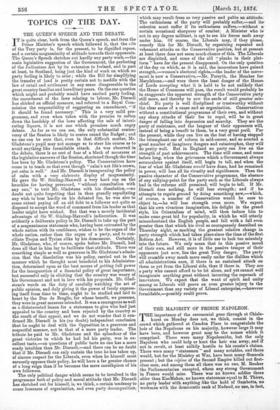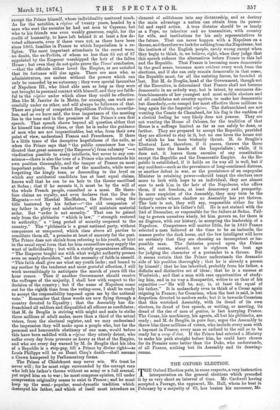THE MAJORITY OF PRINCE NAPOLEON.
THE importance of the ceremonial gone through at Chisle- hurst on Monday does not, we think, consist in the crowd which gathered at Camden Place to congratulate the heir of the Napoleons on his majority, however large it may have been, and however great may be the names which it comprised. There were many Napoleonida3, but the only Napoleon who could help or hurt the heir was away, and if not in revolt, at least sulkily hostile to his cousin's claims. There were many "statesmen " and many notables, and there would, but for the Ministry at War, have been many Generals present ; but the regime of the Second Empire killed out first- class men, and among them all there was no one, M. Rouher the Parliamentarian excepted, whom any strong Government in France would miss. There was no known soldier there abler than MacMahon, no known statesman equal to M. Tillers, no party leader with anything like the hold of Gambetta, no workman with the democratic rank of Nadaud, no one, in fact, except the Prince himself, whose individuality mattered much. As for the notables, a regime of twenty years, headed by a
man who sent the enemies he had not seen to Cayenne, but who to his friends was even weakly generous, ought, for the credit of humanity, to have left behind it at least a few de-
voted adherents, even if there were not, as there have been since 1805, families in France to which Imperialism is a re- ligion. The most important attendants in the crowd were, . no doubt, the ex-Prefets, of whom no less than 65 out of 87 appointed by the Emperor worshipped the heir of the fallen House ; but even they do not quite prove the Times' conclusion, —that the officials either loved the Empire, or are satisfied that its fortunes will rise again. There are men who, as
administrators, are useless without the powers which can only be conceded by an autocracy ; they were special favourites of Napoleon HI., who liked able men as long as they were
not brought in personal contact with himself, and they are faith- ful to the regime under which alone they could be effective.
Men like M. Janvier de la Motte, for example, can work suc- cessfully under no other, and will always be followers of that. There are plenty of competent Republican Prefects, neverthe- less, and as we have said, the true importance of the meeting lies in the tone and in the promises of the Prince's own first speech. That speech shows beyond all question either that he himself has strong ideas, or that he is under the guidance of men who are not impracticables, but who, from their own point of view, understand France and Frenchmen. If there is a little trace of the deceptive hopefulness of the exile, as when the Prince says that " the public conscience has vin- dicated that great memory [the Emperor's] from calumny "—a vindication possible to many intellects, but never to any con- science—there is also the tone of a Prince who understands his own position thoroughly, and the temper of France on most important points. The reader of the manifesto, while never forgetting the kingly tone, or descending to the level on which any accidental candidate has at least equal claims, knows well that he can be no heir to the throne sacrificed at Sedan ; that if he mounts it, it must be by the will of the whole French people, consulted as a mass. He there- fore claims no royalty, and even declares that the Due de Magenta—not Marshal MacMahon, the Prince using the title bestowed by his father—" the old companion of my father in glory and misfortune," will maintain material order. But " order is not security." That can be gained only from the plebiscite " which is law," " strength restored to authority," a " long period of security reopened to the country." The "plebiscite is a great national party, without conquerors or conquered, which rises above all parties to conciliate them all," a promise at least of amnesty for the past.
The Prince does not shrink from referring to his youth, or hint in the usual royal form that for him counsellors may supply the want of individuality ; but with a stately separateness affirms, " The Emperor taught me with what weight authority presses even on manly shoulders," and the necessity of faith in oneself.
"This faith shall give me what my youth lacks ; and bound to my mother by the tenderest and most grateful affection, I will work unremittingly to anticipate the march of years till the hour comes. • Then if another Government should receive
the suffrages of the majority, I shall bow with respect to the decision of the country ; but if the name of Napoleon come out for the eighth time from the voting-urns, I shall be ready
to accept the responsibility imposed upon me by the national vote." Remember that these words are now flying through a country devoted to Equality ; that the Assembly has dis- franchised all soldiers and disqualified all officers as candidates; that M. de Broglie is striving with might and main to strike three millions of adult males, more than a third of the actual
voters, from the electoral register, and we may understand the impression they will make upon a people who, but for the personal and honourable obstinacy of one man, would before this have been saddled with a regime they utterly detest, who suffer every day from pressure as heavy as that of the Empire, and who are every day warned by M. de Broglie that his idea of a Republic is a stop-gap, till a Prince by divine right—as Louis Philippe will be on Henri Cinq's death—shall assume a Crown hampered by Parliamentary forms.
The Prince of Chislehurst may never win. We trust he never will ; for he must reign surrounded by the corrupt race who left his father's throne without an army or a full arsenal, yet urged him on to war ; he must compress opinion, till under compression originality ceases to exist in France ; and he must keep up the semi - popular, semi-dynastic tradition which destroyed his father, and which of itself must introduce an
element of selfishness into any dictatorship, and so destroy the main advantage a nation can obtain from its power- ful and rapid action. A true dictator should be as lonely as a Pope, no inheritor and no transmitter, with country for wife, and institutions for his only representatives to the future. That can never happen with a Napoleon on a throne, and therefore we look for nothing from the Napoleons; but the instinct of the English people, rarely wrong except when they begin to think, is, we believe, right, when they judge that this speech reduces the alternatives before France to this lad and the Republic. That France is becoming more democratic in the good sense, becomes more evident every week from the elections, and if she can only remain democratic in that sense, the Republic must, for all the resisting forces, be founded at last. But M. de Broglie, head of the Government, though not of the Executive, is determined that France shall not become democratic in an orderly way, but is intent, by enormous dis- franchisements of her youngest and most mobile electors and of all candidates not country squires, to make her democratic but disorderly,—to compel her most effective three millions to long again for the Imperial regime. The disfranchised are not wanting the Comte de Chambord, for his flag is the emblem of a clerical feeling he very likely does not possess. They are not wanting the House of Orleans, for the tradition of that House is a suffrage limited as far as can safely be done, or farther. They are prepared to accept the Republic, provided they are allowed to stay in it, but no one loves the house out of which he has been 'violently thrust. M. de Broglie's Electoral Law, therefore, if it passes, throws the three millions into the hands of the Imperialists ; while, if it does not, it leaves them enemies of any constitution except the Republic and the Democratic Empire. As the Re- public is established, if it holds on its way all is well, but if any accident—such as the prevalence of long-continued distress, or another defeat in war, or the persistence of an unpopular Minister in retaining power—should tempt the electors once more to look with hope to an individual, they are almost sure to seek h:m in the heir of the Napoleons, who offers them, if not freedom, at least democracy and prosperity. In mere suspicioti of the Assembly, they may turn to the dynasty under whose shadow no Assembly has yet thriven. The heir is not, they will say, responsible either for his father's errors or his father's fall. He is not stained with the 2nd of December, or responsible for the failure at Sedan. Fail- ing to govern ourselves wisely, let him govern us, for there is no disgrace, with our history, in accepting the leadership of a Napoleon. Competence will matter little, for in 1849 France selected a man believed at the time to be an imbecile, the masses prefer the dark horse, and the few intelligent will have no certainty that they are choosing an incompetent or im- possible man. The flatteries poured upon the Prince are, of course, absurd, nor is eighteen the beat age for judging the character of a pretender to a throne. But it seems certain that the Prince understands the dramatic side of his position thoroughly ; that he is already a person by himself ; that he has inherited, probably from his father, a definite and distinctive set of ideas ; that he is a success at Woolwich ; and that a man with rare opportunities of study- ing him, and in no way a Bonapartist, writes to us thus of his capacities :—" He will be, nay, is, at least the equal of his father." It is melancholy even to think of a Caesar again reigning in France; for Czesarism, when the best is said, is but despotism directed to modern ends; but it is towards Czesarism
that this wretched Assembly, with its dread of its own electors, its dread of free speech, or writing, or meeting, its dread of the rise of men of genius, is fast hurrying France.
The Caesar, his machinery, his agents, all but his plebiscite, are ready ; and M. de Broglie, in pure fear, urges the Assembly to throw him three millions of voters, who include every man with
a bayonet in France, every man so unfixed to the soil as to be ready for a coup d'e'tat. If the Prince had selected a Ministry
to make his path straight before him, he could have chosen for its Premier none better than the Duke, who understands, of all France, nothing but its Assembly and its drawing- rooms.







































 Previous page
Previous page